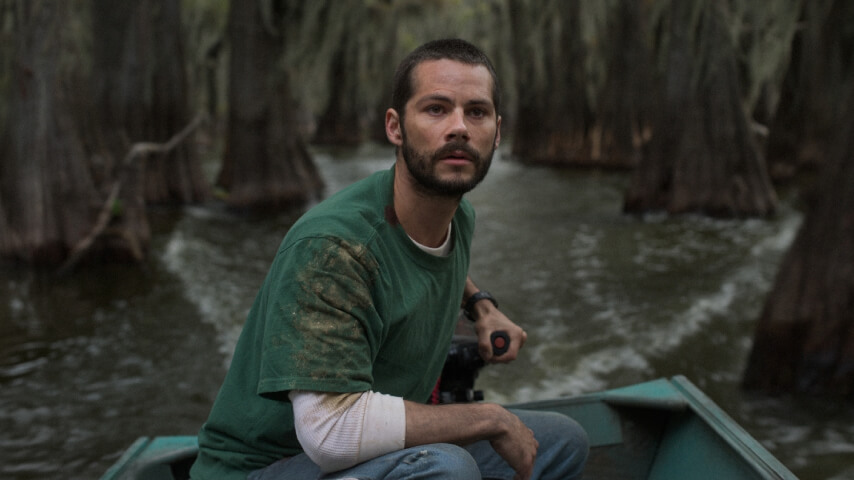It’s not just the water that’s murky out on Caddo Lake. Death and disappearance abound in the swamp cypress labyrinth dividing East Texas and Louisiana, but without excitement or dread. Rather, this thriller’s incidents occur only to build up to a clarifying “ah-ha” moment, which occurs between several ho-hum moments. Part of reviewing this film means being politely asked by its studio to refrain from talking about almost any relevant aspect of its content, but knowing that Caddo Lake comes “from producer M. Night Shyamalan” (emblazoned in a place of pride on the poster) might accurately set expectations. Acting on those expectations accordingly, writer-directors Celine Held and Logan George, who helmed a few episodes of Shyamalan’s Servant, get lost in the very sensibility that may have initially attracted the filmmaker to their sophomore feature. Held and George’s film twists and turns, but charting their narrative swamp is a simple and unrewarding exercise.
Caddo Lake’s story floats down two narrative channels, which are eventually braided into an all-consuming quagmire. In one, Ellie (Eliza Scanlen) and her family search for her little step-sister Anna (Caroline Falk), who went missing overnight. In the other, stoic scrapper Paris (Dylan O’Brien) works through some elements of his mom’s illness and death that don’t quite sit right with him. Their shared hardscrabble lake community is the initial link, though so too is the otherworldly weirdness on its fringes.
As the lake’s water level drops, animals once thought to have abandoned the area for good are returning; a wolf-gutted gator provides one of the film’s more striking images. But Held and George don’t have anything as pertinent as the environmental effects of climate change on their minds as they document an environment’s climate-driven changes. These fluctuations seem to be cyclical and correspond, in part, to the seizures afflicting Paris’ late mother. They also correspond with an increase in goofy VFX work, bleeding ears, and shaking hands—all telltale movie signs of the vaguely supernatural.
Figuring out exactly what is going on here takes up the second act of Caddo Lake. The third act, rather than making that revelation mean anything, is content to simply watch its characters go around explaining it to each other.
If these characters had any substance beneath their beat-up ballcaps and muddy waders, that approach could work. But the leads are mostly there to motor around on skiffs, grim-faced and desperate, getting the camera from bog A to muck B while the supporting cast members play plot devices. Ellie’s grumpy mom Celeste (Lauren Ambrose) and Paris’ girlfriend Cee (Diana Hopper)—both playing what I’ll call Chekhov’s Redheads—get about half a scene each to establish themselves; both do about as much as Scanlen and O’Brien accomplish over the course of the whole movie. It’s not that anyone’s phoning it in, but that nobody’s really playing a character, just warm bodies that the plot happens to.
Because there’s so little personality to go around, Caddo Lake’s sense of place might be its main selling point. The location shooting and realistic production design details aren’t so immersive that the film’s lack of heartbeat is forgivable, but it’s certainly more thoughtful than glossy pieces of Kentucky Fried Filmmaking like Where The Crawdads Sing. Shot in the same kinds of uniform wetland that lent films like Southern Comfort their sense of claustrophobia, with each mile of flooded forest blurring into the next, Caddo Lake traps its characters in natural, maze-like minefields where cypress knees protrude out of the water like wooden stalagmites. When they come up for air in relatively brief sojourns to civilization, the rusty trucks and colorful throwaway area names, like Hog Wallow and Government Ditch, build out a rural community that never feels cartoonish.
Yet even this specificity is sometimes undermined. A cringe-inducing moment of mimed make-believe between Paris and Cee is more L.A. improv class than blue-collar Texas, and a brief interaction between Paris and some good ol’ boys falls fully flat. These small failures, combined with the botched crosscutting that represents Held and George’s most adventurous directorial choice, leaves Caddo Lake stylistically high and dry. The film is so starved for energy that a short boat chase is all the more disappointing for its brevity. When the waves settle, the film is still mired in plot, slogging through the same repetitive scenes of boating and wading and frowning in thought.
What exactly they’re thinking about can’t be discussed here, but what can be discussed is how single-minded these thoughts are. Caddo Lake devotes itself to its one underexplored idea, which is obscure not because it’s a complex or thoroughly considered idea, but because the filmmaking conveying it is unclear and the storytelling incorporating it is bare. Without cleverness or clarity, the plot’s only option for getting to the finish line is over-explanation—there’s a famous novelty song that epitomizes how much like a flowchart Caddo Lake ends up feeling. Without any of the deeper emotions and themes permeating the (un)expected pivots that have become his hallmark, Caddo Lake risks becoming a caricature of its Shyamalan pedigree.
Director: Celine Held, Logan George
Writer: Celine Held, Logan George
Starring: Dylan O’Brien, Eliza Scanlen, Diana Hopper, Caroline Falk, Sam Hennings, Eric Lange, Lauren Ambrose
Release Date: October 10, 2024 (Max)









































